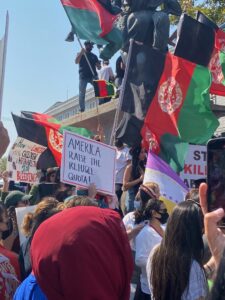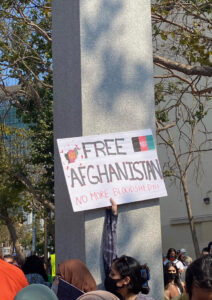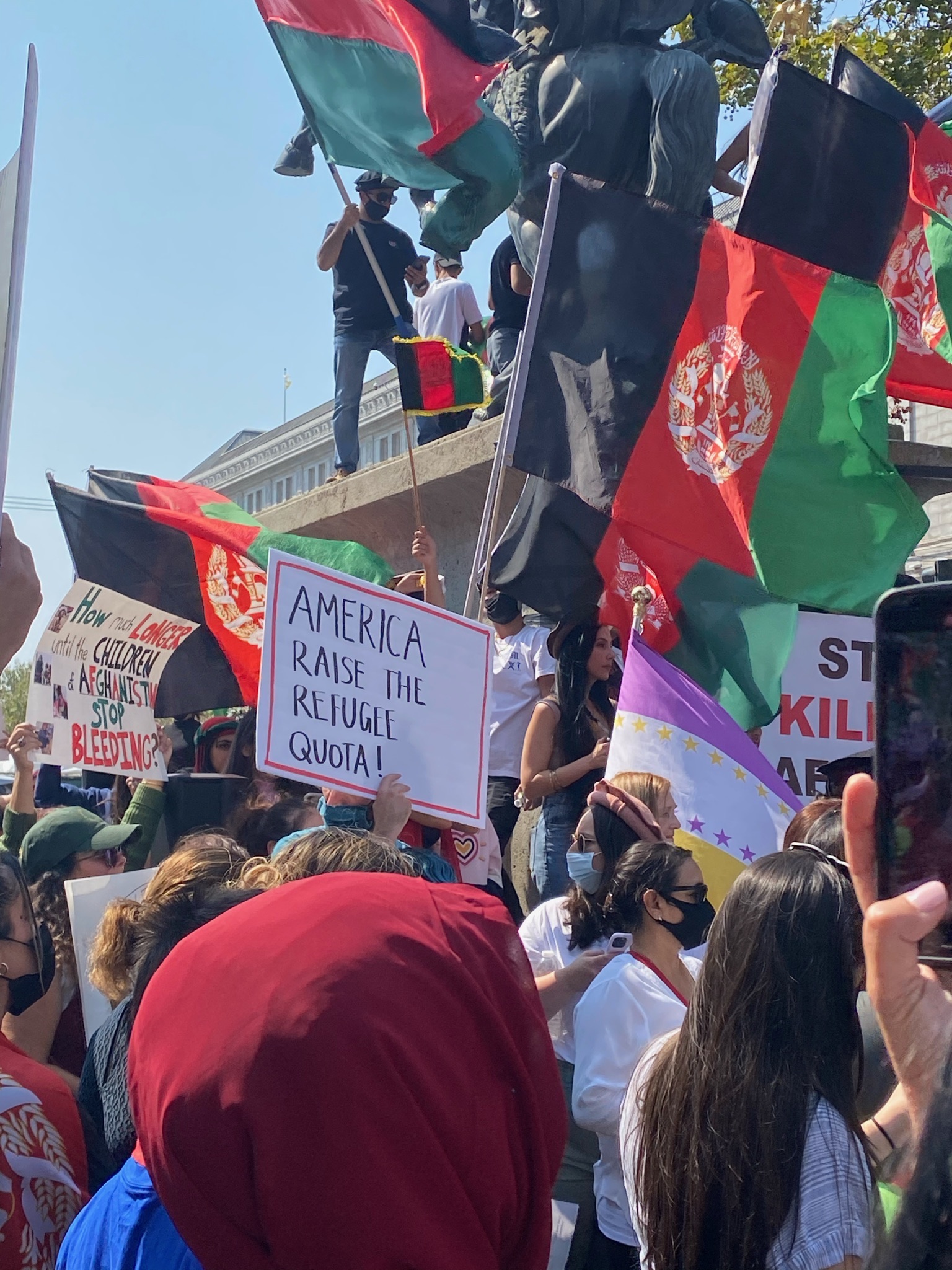Hundreds of people gathered on Saturday, August 28 at the United Nations Plaza in San Francisco to protest the rise of the Taliban and the U.S. withdrawal from Afghanistan. Organized by the Afghan Student Associations (ASAs) of several University of California (UC) schools, community leaders who addressed the protest expressed anger at President Biden’s recent conduct and the U.S. government’s historical conduct in Afghanistan.

Photo by Kiana Sezawar Keshavarz
Many of the protesters were of Afghan descent.
Since August 28, as the American exit date of August 31 loomed, the situation in Afghanistan had been hardening and deteriorating and the world and its news cycles have spiraled on. But Afghanistan is still there and those at the protest who raised their voices wanted and tried to affect its future. They spoke for those in Afghanistan who remain and for those who fled.
“I’m Afghan, I was a refugee in the late 80s, I have family there now, I have extended family there now and this whole thing, the last 30 years of watching Afghanistan go through so much war, so much pain, what people are going through right now, struggling, I had to come out here and do something,” said an anonymous protester.
Former ASA President, Samana Gouhary passionately described her connection, “If I wasn’t here today, I wouldn’t be respecting what my parents went through. There is a missing part of me right now.”
“We are here because we want global awareness… we want the people of Afghanistan to be able to choose their own government,” said an unnamed protestor, running to catch up with the crowd.
Delivering speeches into local news microphones and cameras, community leaders advocated for fair and inclusive Afghan elections, federal and international commitment to open-door refugee policies, and open border crossings between Afghanistan and its neighboring countries.
One protestor, who preferred to remain unnamed, declared at the August 28 UN Plaza protest, “(The U.S.) created the refugee crisis, so they must deal with it. It’s actually a moral obligation.”
Sunaina Maira, a professor of Asian-American studies at UC Davis and a protester said the current administration’s border policy regarding Afghan refugees “is atrocious, it’s miserable, it’s so incredibly irresponsible and inhumane.”
The United States’ exit from Afghanistan created an immigration crisis. Afghans tried to flee Afghanistan, and people had flooded into cities still outside Taliban control before the Taliban had taken over Afghanistan.
By August 19, according to the New York Times, around 30,000 people were leaving Afghanistan each week.
In the last days before the U.S. exit, the Biden administration hoped to airlift 50,000 to 65,000 Afghan refugees out of Afghanistan.
In total, the U.S. evacuated 65,000 Afghans. 24,000 people have come to the U.S. according to a Reuters article in August.
About 23,000 of the Afghan refugees evacuated in the airlift before August 31. They were moved to military bases around the United States. Additionally, about the same number of refugees were housed on U.S. bases overseas, mainly in Germany. For a time, flights that brought refugees to the U.S. had been paused because of a measles outbreak.

photo by Kiana Sezawar Keshavarz
The protest was part of many local efforts to help Afghan refugees. Organizations like Opening Doors, citywide efforts in Hayward and Fremont, Catholic Charities, Lutheran immigration services and Jewish family services in the East Bay, have all been active in the resettlement of refugees in the Bay Area. These organizations are vital to resettlement, especially considering significant Afghan populations in the Bay Area.
“Out of the 200,000 refugees that they (the U.S.) are expecting from Afghanistan, a third will end up in California,” said Humaira Ghilzai, an Afghan-American writer, speaker, and cultural advisor. Ghilzai lives in San Francisco.
Ghilzai highlighted an important part of the support system Afghan refugees will have in the Bay Area from the already established Afghan community, many of whom arrived here and were granted asylum after the 1979 Soviet Invasion of Afghanistan. Ghilzai described the Afghan coalition based in Fremont. “They’ve been helping Afghan communities for a very long time,”
Large Afghan communities reside in Alameda and Contra Costa counties. According to the 2019 U.S. Census data, around 66,000 people of Afghan descent reside in California.
At the San Francisco protest, many protesters, who were Afghan-American, were frustrated about the general public’s ignorance about the historical context of this issue. Neena, a first-generation Afghan American who chose not to disclose their full name, said, “I think (non-Afghans) need to know the history of how the U.S. went into Afghanistan, how they (the U.S.) created the Mujahideen which then turned into the Taliban, which then turned into Al-Qaeda.”
“We want to be able to see (that) Afghanistan again… there are so many children who have been born into war who only know war,” said Neena, representing the desires of the crowd. “We don’t want to keep repeating that pattern, that’s why we are here,” said Neena, describing the desires of the crowd gathered in solidarity.
As the gateway between Asia and Europe, the area known as Afghanistan has historically been invaded and occupied by a long list of imperial states. These include Babylon, Macedonia, Iran, the Mongols, various Arab conquerors, Great Britain, the U.S.S.R., in 1979 and the United States in 2001. Neena reminded the crowd at the protest of this history.






